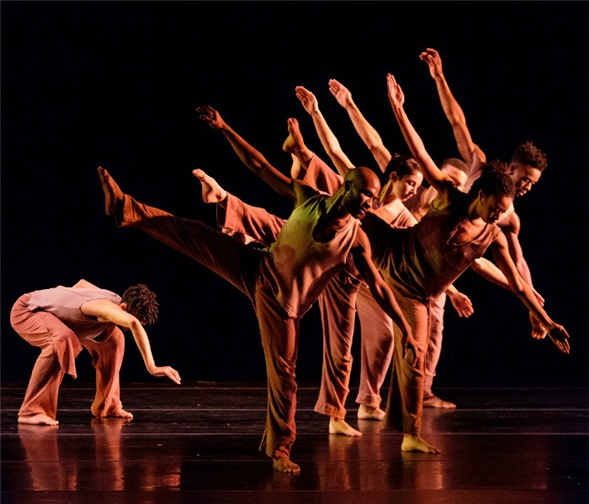Translate Page

The Tony-winning choreographer of The Lion King debuts new work at the Joyce
---
Choreographer Garth Fagan is having quite a month. This past Sunday, he helped celebrate the 20th anniversary of Broadway's The Lion King, for which he won a 1998 Tony Award for Best Choreography. And this week, his eponymous 47-year-old dance company returns to the Joyce Theater with four premieres -- two world and two New York -- along with other repertoire.
Fagan's choreography goes in unexpected directions and draws on multiple techniques thanks to his eclectic background. The 77-year old began as a dancer in his native Jamaica, absorbing Afro-Caribbean influences while performing with the country's national dance company. Later, as an eager young student in New York City, he learned from modern dance luminaries such as Martha Graham, José Limón, and Alvin Ailey. In 1970 he moved to Rochester, NY and founded his troupe, which has an immediately recognizable style. His dancers move with sensual fluidity as well as fierce strength -- dynamically explosive one moment, serenely meditative the next. What never alters is their intensely focused, deeply intelligent stage presence.
"He's always ahead of the curve," says Norwood "PJ" Pennewell, a veteran company member who has also choreographed for the troupe since 2010. "Garth's always breaking the mold, but making sure you're aware that he really knows what the mold was. He always has an immaculate understanding of his music. And he's always challenging himself to strive even deeper psychologically, while still maintaining a wonderful physicality."
Fagan's unique work caught Tony-winning director Julie Taymor's eye back when she was developing The Lion King for the stage. She invited him to choreograph the musical, though first he asked to borrow a video of the 1994 Disney film as he had never seen it. Pennewell and fellow longtime Fagan dancer Natalie Rogers accompanied the choreographer to the 20th anniversary festivities since they served as his assistants on The Lion King, his sole Broadway credit. "We worked hard," Fagan recalls. "I had PJ and Natalie so I could try out different things before I took it to the dancers. They're fearless and they know me."
"It was eye-opening to be able to help Garth in the creation of the musical, with all the components that are involved," Pennewell says. "I watched him switch gears from the concert stage concept, where his dances can take anywhere from 20 to 40 minutes to develop, unfold, and resolve. With Broadway, you have to make that statement in three to seven minutes. It was interesting seeing him distill content the way that he did and still make the dancing so cohesive with the rest of the show."
The income from The Lion King's numerous productions throughout the world has helped sustain Fagan's nonprofit dance company, for which he continues to create new works set to a dizzying array of music. The troupe tours internationally but returns almost every year to the Joyce. This year's lineup includes the New York premiere of In Conflict set to three pieces by Estonian classical composer Arvo Pärt. "It was exactly what I needed: Something contemporary but still with beautiful legato phrases," Fagan says. "It starts out with a solo for Natalie. Oh lord, it's just a joy to see a mature woman dancing that beautifully! With so many kids today, you get technique, but that's all you get. She has technique, but she also gives you feeling and spirit and emotions and intellect."
ESTROGEN/GENIUS is a world premiere Fagan crafted for his company's female dancers, set (perhaps ironically) to recordings by Naturally 7, an all-male a cappella group. "The solos show off the strength and peace and fortitude of women," he says. "Women can multitask in a way we men could never imagine. We do two things and we're whupped!"
Meanwhile, Pennewell has two works as choreographer in the program. For the New York premiere A Moderate Cease, he used scores by two 20th-century British composers: William Walton and Imogen Holst. "The inspiration was a challenge to myself to use classical music, since I'd used a lot of contemporary music in the past," he explains. But for the brand-new Wecoo Duende, "I needed to go 180 degrees in the opposite direction," he says. "I found this Doudou N'Diaye Rose drum orchestra. I just needed to hear some African drumming because of how I was feeling. When we had toured Africa we went to several traditional dance events. So the piece is loosely based on the structure that I saw in some of those African dance concerts."
Choreographing pieces that must stand alongside his mentor's work is a responsibility Pennewell takes quite seriously. He's unstinting in his admiration for what Fagan achieves. "The way Garth can weave a dramatic through-line is astonishing to me," Pennewell says. "I always wait with great anticipation to see how he's going to wrap up a dance. When you think you know where he's going with the resolution, he always takes a slight turn away, and then hits you with this wonderful conclusion. He maintains this level of unpredictability."
---
Susan Reiter regularly covers dance for TDF Stages
Top image: A Moderate Cease. Photo by Erich Camping.
TDF Members: Go here to browse our latest discounts for dance, theatre, and concerts.